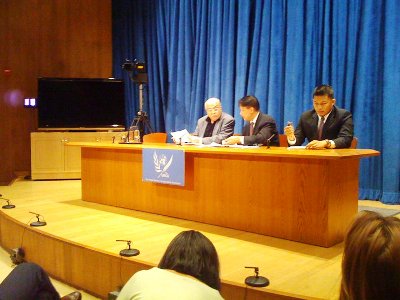Representatives of Burmese ethnic groups and opposition parties have asked the United Nations (UN) to help resolve the country’s ethnic issues ...
Representatives of Burmese ethnic groups and opposition parties have asked the United Nations (UN) to help resolve the country’s ethnic issues, during discussions this week at the UN headquarters in New York.
 The meeting, between the UN and the representatives of Burma’s opposition groups was held on Tuesday November 9, at the UN Correspondents Association, in New York. It was attended by General Secretary Gum San Nsang, from the Kachin National Organization (KNO-USA), Ms. Zipporrah Sein, General Secretary of the Karen National Union (KNU), Dr. Thaung Htun, Executive Director of the Burma Fund-UN Office, and U Tin Win, Executive Member of the National League for Democracy (NLD) party.
The meeting, between the UN and the representatives of Burma’s opposition groups was held on Tuesday November 9, at the UN Correspondents Association, in New York. It was attended by General Secretary Gum San Nsang, from the Kachin National Organization (KNO-USA), Ms. Zipporrah Sein, General Secretary of the Karen National Union (KNU), Dr. Thaung Htun, Executive Director of the Burma Fund-UN Office, and U Tin Win, Executive Member of the National League for Democracy (NLD) party.
“We want a genuine dialogue with the junta, with us on equal terms, with the UN and our neighbours as facilitators,” according to Gum San, of the KNO-USA.
The Beijing Bureau of the Xinhua News Agency, of China’s state-run media, also attended the meeting, Gum San said.
About 20 UN Correspondents from major news agencies including AFP, and Kyodo News, also attended.
Gum San said he raised the issue about escalating preparations for war in the ethnic areas.
He said Kachins have exhausted all their efforts to establish a dialogue with the regime, the real wish of the recently formed ethnic armed group’s Committee for Emergence of A Federal Union, made up of the Chin National Front (CNF), Kachin Independence Army (KIA), Karenni National Progressive Party (KNPP), KNU, New Mon State Party (NMSP), and the Shan State Army-North (SSA-N).
“The UN must take a firm stand in denouncing the results of the recent rigged election. And, the UN should help ethnic groups directly in their humanitarian efforts,” said Gum San.
He also said the UN and Burma’s neighbours should act as facilitators in a tripartite dialogue, and that China should actively engage with Burma to help it becoming a state with good governance and greater transparency “because China's long term economic and social interests are in-line with a stable Burma,” he added.
“We are hopeful the UN will respond to our requests, since we are voicing the aspirations of the 52 million people of Burma,” Gum San said.
The opposition groups said if armed conflicts between the Burmese Army and all the ethnic armed groups are renewed, it will create great instability on both the Thai and Chinese borders, at levels not experienced in the past two decades.
The opposition political parties inside the country, and in exile, called the election “a sham”. And, during the election the opposition parties revealed how the military junta-backed Union Solidarity and Development Party (USDP) used widespread voter intimidation vote fraud to achieve what it is calling a clear victory.
The Canadian government condemned the regime for ignoring their demand that the election be free and fair and held according to international standards and democratic principles, and for failing to release all the country’s political prisoners, including Burma’s democracy icon Daw Aung San Suu Kyi.
“Canada is deeply disappointed that the regime did not live up to its own commitment to hold a free and fair election. We are also concerned by reports of outbreaks of violence in border areas in the aftermath of the election,” the Foreign Affairs Department said in a statement released on November 8.
However, China and the Association of South East Asian Nations (ASEAN) continue to support the junta’s agenda for democratic reform, known as the ‘Seven Step Road Map for Democracy’.
ASEAN stands ready to assist Burma, according to the junta controlled New Light of Myanmar in an article published on November 11.
“ASEAN welcomes the general elections held on 7 November 2010, in Myanmar, as a significant step forward in the implementation of the seven-step ‘Roadmap for Democracy’…,” an ASEAN official said in the state-run media.


